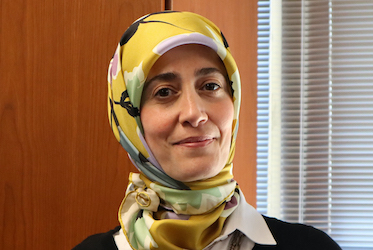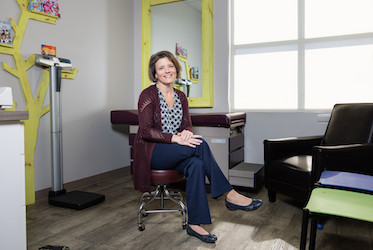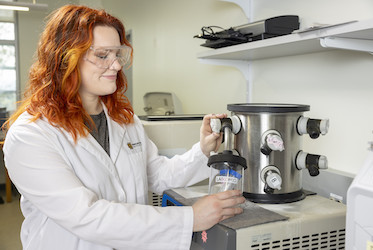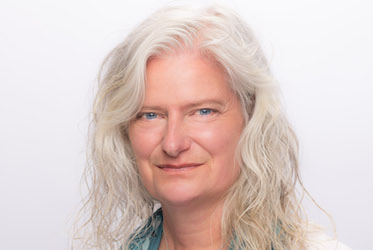
Cultivating Innovation
KENNESAW, Ga. | Jun 12, 2018
New applied research lab focuses on student experience

Whether it’s probing fungal diseases in bats or better ways to cultivate mushrooms and brew beer, a vibrant new research lab is driving scientific innovation at Kennesaw State.
At the heart of the BioInnovation Lab – one of the largest under the University’s Office of Research – is a mission to understand complex problems involving microorganisms and find new ways of solving those problems through applied research.
At its helm is research scientist Chris Cornelison, who opened the lab less than two years ago.
Cornelison, who came to KSU in 2016, set out to create a hybrid laboratory, providing a traditional lab experience while mentoring students in research, and, at the same time, serving as an incubator for new scientists on campus who need space to start up their research activities.
This evolving research hub has attracted an enthusiastic group of researchers this year, including a post-doctoral researcher, two graduate students and 10 undergraduates in biology and chemistry.
With six projects underway, Cornelison said the lab is focused is on developing intellectual property that is commercially viable and obtaining external funding to support the lab’s research activities.
“Sometimes, there is an emphasis in the sciences on invention, coming up with new ideas, technologies and processes that have never been developed, and that can be really difficult,” Cornelison said.
But with innovation as the driver, researchers in the BioInnovation Lab build on someone else’s discovery and apply it to new problems to solve issues.

In order to come up with innovative solutions, the lab relies on science, but veers from the standard scientific approach.
“Our projects are within the framework of a hypothesis, but we don’t do hypothesis-driven research, fundamentally,” Cornelison explained. “We solve problems by first recognizing all of the challenges, and then we try to tackle each of the challenges one at a time. We take the fundamental understanding of biology and use it to solve problems. That’s the bioinnovation.”
Learning to research
The BioInnovation Lab’s research centers on microorganisms, such as fungi and bacteria, and students explore microbial properties to enhance or improve a process, characterize bacteria and yeast for specific applications, or manage pathogens.
Students from multiple branches of science work in teams to isolate variables to understand natural phenomenon, and use that knowledge to contribute to the lab’s innovations. For example, Cornelison explained, students study strains of yeast isolates to identify those that demonstrate a higher ethanol tolerance during beer fermentation.

Students work independently at varying levels in the lab, yet function in research teams, with graduate students leading multiple teams to support the various projects. They frequently begin by shadowing the lab’s more senior researchers to determine which team best suits their individual interests.
That’s how Austin Campbell, a junior biology major, spent his first semester. Even though he only had taken a limited number of courses in his major, the research experience taught him techniques and processes early on, he said.
“I feel like everything in the lab has helped me prepare for the other classes that I have to take, and now I have a better understanding of the material because I learned it from the ground by physically doing it,” Campbell said. “Failing and doing it again until it works has helped me way more in relation to my project and upper-level classes.”
There is no hand-holding in the BioInnovation Lab, according to Cornelison. Students are expected to be productive researchers, confident in tackling problems and not afraid to learn new things.
“When students are personally invested in the project and they like it, they do far better work,” he said. “We find a way to carve out a niche for them in the project they are most interested in. That’s when they have the greatest value to the lab, and I think that’s when they have the most beneficial experience.”
The BioInnovation Lab experience has inspired many students to reconsider their career paths. As a biochemistry major, Ashley McDonald wanted to work for the CDC post-graduation, but after surveying bats in the field, her interest shifted.
“I do a lot of microbiology, and I’ve grown in other aspects of science being exposed to it in the lab,” said McDonald. “Now, I’d like to go into wildlife epidemiology.”

She also said that working alongside others with different backgrounds and interests has been “cool to see us come together,” and she enjoys the hands-on approach in the BioInnovation Lab.
“Many labs are computer-based only, where students conduct research using simulation,” she said. “The research doesn’t always do what it’s supposed to do. It’s science, and we have to adjust to that.”
Bio-Innovating
Here are some of the exciting projects underway in Kennesaw State’s BioInnovation Lab:
Small-scale fermentation
Local breweries in Atlanta’s thriving craft beer market have turned to the BioInnovation Lab for a more scientific approach to brewing beer and dealing with quality control challenges.
“Brewers have a real craving for scientific support and as their operations grew, they were experiencing challenges and didn’t have the instrumentation to deal with the problems,” Cornelison said.
Brewers want to create reproducible products that their consumers could count on, and analytical science can help provide that. To create small-scale fermentation in the lab, the team tests different strains of yeast and bacteria, at different temperatures and variables, to produce a range of outcomes.

Taking swabs from the inside of a beer barrel, the team grows yeast isolates to better understand how wild yeasts preform in beer fermentation, explained Daniel Wokoma, a senior biology major. For brewers, this characterization can help them increase alcohol content and improve flavor.
“It smells like black-eyed peas,” said Drew Toomer, a biology major, as the team conducted sensory analysis of experimental beers brewed in the lab. Other beer-related projects involve using analytical chemistry to understand hop aromas and flavor perception in beer.
“Brewers are trained under this idea that there are contaminants and they are bad,” Cornelison said. “For us, these are organisms that can be controlled and manipulated for a given outcome.”
Saving bats
Cornelison began work with fungal disease in bats as a post-doctoral researcher, when he learned that hibernating North American bats were dying at an unsustainable rate from a highly contagious disease, called white-nose syndrome.
Investigating methods to best treat them, he directed his efforts on fumigation technologies. Today, research focuses on creating embedded technologies for autonomous distribution of anti-fungal fumigates. “Scientists may find some remedy that works against the pathogens, but logistically how do you deliver that to a bat on a mine ceiling 50 feet up?” Cornelison asked. To best meet that challenge, postdoctoral researcher Kyle Gabriel designed a working prototype that could treat an entire bat colony.

The team is developing a multi-year mitigation strategy for white-nose syndrome at a single hibernaculum in North Georgia.
Another research team in the lab is surveying bat populations along roadways in Georgia. Graduate student Kelly Lutsch spent most of the winter trudging into dark highway culverts with a small research team to identify bat species, conduct a census and evaluate fungal infestation.
Mushroom mania
A new project, with the University’s Hickory Grove Farm, is cultivating new varieties of mushrooms. According to Cornelison, hundreds of edible mushrooms exist in North America, yet only a handful are grown for human consumption.
A grant is funding support, led by Cornelison and Gabriel, for the lab to develop technologies for high-yield production of specialty varieties such as lion’s mane and oyster mushrooms. These cultures are currently being grown in the BioInnovation Lab, and will expand into fabricated modules at the farm in the near future.
– Tiffany Capuano
Photos by David Caselli and Lauren Kress
***
To read more of Kennesaw State University Magazine, click here.
Related Stories

KSU researcher creates environment that allows students to thrive

Kennesaw State researcher applies mathematical modeling expertise to health care systems

From the salon to the lab, chemistry student shines at Kennesaw State

Academic leader, researcher named dean of Kennesaw State's College of Science and Mathematics
A leader in innovative teaching and learning, Kennesaw State University offers undergraduate, graduate and doctoral degrees to its more than 45,000 students. Kennesaw State is a member of the University System of Georgia with 11 academic colleges. The university’s vibrant campus culture, diverse population, strong global ties and entrepreneurial spirit draw students from throughout the country and the world. Kennesaw State is a Carnegie-designated doctoral research institution (R2), placing it among an elite group of only 7 percent of U.S. colleges and universities with an R1 or R2 status. For more information, visit kennesaw.edu.















